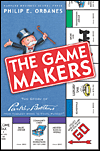December 22, 2003
Parker Brothers & the Monopoly® Monopoly
 Having been an undergraduate history major, as well as someone interested in business and competition, I recently found an excerpt from a new business history on Parker Brothers, the board game company, on Harvard B-School’s "Working Knowledge" site. Even if you’re not buying board games for the family this Christmas, it’s a pretty interesting story:
Having been an undergraduate history major, as well as someone interested in business and competition, I recently found an excerpt from a new business history on Parker Brothers, the board game company, on Harvard B-School’s "Working Knowledge" site. Even if you’re not buying board games for the family this Christmas, it’s a pretty interesting story:
-
In 1883, George Parker was 16 years old, and he liked to play board games. But he and his friends were tired of the "heavy-handed moral lessons" of the typical board game, and George, an inventive young man, created his own game, called Banking (chartered banks were a relatively new thing in the U.S., and people were fascinated by the whole subject). It was a success, and soon George and his brother, Charles, formed their own company, Parker Brothers.
The Monopoly game, Trivial Pursuit, Clue, Boggle, and Risk are more than just games to us - they're part of America. All of these games were published by one company, Parker Brothers, which began as the dream of a sixteen-year-old boy, over one hundred years ago.
In "The Game Makers", industry expert Phil Orbanes reveals how, by adhering to the principles of its founder, Parker Brothers rose to prominence, overcame obstacles, and forged lasting success. Orbanes, a game historian and former executive at Parker Brothers, draws from company archives, interviews with surviving family members, and the newly discovered records of founder George Parker to tell a story rich in examples of business acumen that spans world wars, family tragedy, the Great Depression, and global competition.
That said, I also found a critique of George Parker’s claim to fame, called "The Billion Dollar Monopoly Swindle", which claims Parker wasn’t so original after all and should take his place among his turn-of-the-century-robber-baron-peers:
-
Part detective novel, part history, and part horror story, The Billion Dollar Monopoly® Swindle not only recounts the true history behind one of the world's most popular board games but also reveals a world where the law sometimes seems as arbitrary and unfair as a "Go directly to jail" card. When Ralph Anspach released his game Anti-Monopoly in 1973, he suddenly found himself in the crosshairs of the formidable Parker Brothers legal machine, which claimed that his use of the word monopoly violated copyright laws. While conducting research to gauge the strength of Parker Brothers' case, Anspach discovered that the corporate giant might not even have the rights to the game.
His investigation revealed the existence of a board game called the Landlord's Game that had been played at least 30 years before Parker Brothers published Monopoly in 1935. When Charles B. Darrow was introduced to this game by a group of Quakers, he copied their board and rules verbatim (even duplicating their misspelling of "Marvin Gardens"), then sold it as his own creation. Parker Brothers supported him, putting a copy of the "story of Monopoly" that cited him as creator in every box.
As for the Anti-Monopoly case, Anspach faced down the game moguls in a battle that went all the way to the Supreme Court (and included an unexpected appearance by future independent counsel Kenneth Starr). You can still play Anti-Monopoly today - and Anspach has even started packaging the original version in the game boxes as a bonus.
Sounds a little like revenge to me - Anspach's attempts to poke PB after getting waxed in court. Still, it's interesting how even a game company knows how to protect its competitive interests.
- Arik
Posted by Arik Johnson at December 22, 2003 03:48 PM | TrackBack "Competitive Intelligence applies the lessons of competition and principles of intelligence to the need for every business to gain awareness and predictability of market risk and opportunity. By doing so, CI has the power to transform an enterprise from also-ran into a real winner, with agility enough to create and maintain sustainable competitive advantage."
"Competitive Intelligence applies the lessons of competition and principles of intelligence to the need for every business to gain awareness and predictability of market risk and opportunity. By doing so, CI has the power to transform an enterprise from also-ran into a real winner, with agility enough to create and maintain sustainable competitive advantage."
